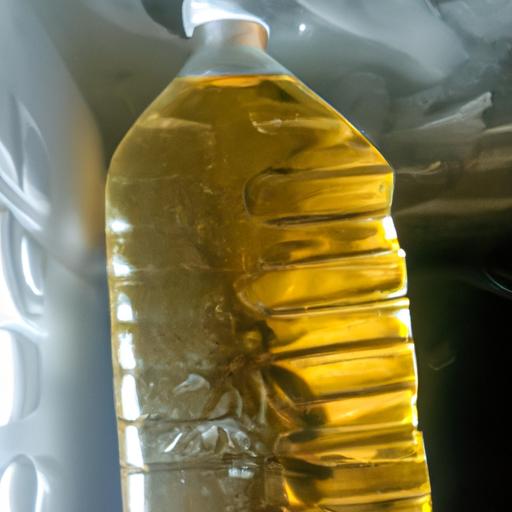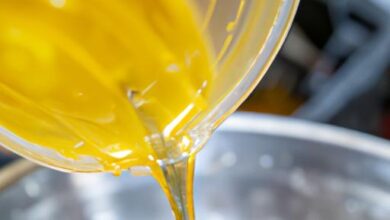Does Cooking Oil Freeze? Understanding the Science Behind It

When it comes to cooking oil, we often find ourselves wondering about its characteristics and properties. One intriguing question that arises is whether cooking oil can freeze. Have you ever pondered upon this? Well, today, let’s dive into the fascinating world of cooking oil and explore the truth behind its freezing point.
Cooking oil plays a vital role in our culinary endeavors, whether it’s sautéing vegetables, frying crispy chicken, or baking delectable pastries. Understanding the freezing point of cooking oil is crucial for proper storage and usage. So, let’s unravel this mystery together.
Cooking oil, just like any other liquid, is susceptible to freezing under specific conditions. However, the freezing point of cooking oil varies depending on its composition and type. Different oils have different chemical structures, which directly influence their freezing points. Let’s take a closer look at some common cooking oils and their freezing points.
Vegetable oil, a popular choice for cooking due to its neutral flavor and high smoke point, typically freezes around 32°F (0°C). On the other hand, olive oil, known for its distinct flavor and health benefits, has a slightly lower freezing point of approximately 21°F (-6°C). Canola oil, often praised for its low saturated fat content, freezes at a similar temperature as vegetable oil.
Understanding the freezing points of various cooking oils is essential for maintaining their quality and preventing any potential issues. Freezing can affect the texture, flavor, and nutritional value of the oil, potentially diminishing its overall quality. Moreover, the formation of ice crystals during freezing may cause the oil to become cloudy or develop an unpleasant taste.
To preserve the quality of your cooking oil, proper storage is key. Storing the oil in a cool, dark place can help prevent freezing. It is important to note that the freezing point of oil can be influenced by factors such as additives and processing techniques. Therefore, always check the packaging or manufacturer’s instructions for specific storage recommendations.
In conclusion, while cooking oil can indeed freeze, the freezing point varies depending on the type of oil. Being aware of the freezing point of your chosen oil is crucial for maintaining its quality and effectiveness in your culinary endeavors. Join me as we further explore the effects of freezing on cooking oil and the best practices for its storage. Stay tuned!
words
What is Freezing Point?
Definition of Freezing Point and Its Significance
To understand the freezing point of cooking oil, we must first grasp the concept of freezing point itself. The freezing point refers to the temperature at which a substance transitions from its liquid state to a solid state. It is a critical characteristic that helps us determine the behavior of different materials under varying temperatures.
The significance of freezing point lies in its ability to provide valuable insights into the physical properties of substances. By knowing the freezing point, we can predict and control the behavior of cooking oil during storage, transportation, and usage. This knowledge enables us to make informed decisions in the kitchen and ensures the optimal performance of cooking oil in various culinary applications.
How Temperature Affects the State of Matter
To comprehend the freezing point, we need to understand the relationship between temperature and the state of matter. Temperature plays a fundamental role in determining whether a substance exists as a solid, liquid, or gas. As the temperature decreases, the kinetic energy of the molecules decreases as well, causing them to move more slowly and eventually form a solid lattice structure.
By lowering the temperature of a liquid, we can reach a point where the attractive forces between the molecules overcome their thermal energy, leading to the formation of a solid. This critical temperature, known as the freezing point, varies for different substances, including cooking oils.
Introduction to the Concept of Freezing Point Depression
Freezing point depression is an intriguing phenomenon that affects the freezing point of a substance when a solute is dissolved in it. The presence of impurities or additives can lower the freezing point of the substance, causing it to freeze at a lower temperature than its pure form. This concept is particularly relevant when considering the freezing point of cooking oil, as certain additives or processing techniques can alter its freezing characteristics.
Understanding the concept of freezing point depression helps us comprehend why cooking oils have different freezing points. Factors such as the purity of the oil, the presence of impurities, and the addition of flavorings or preservatives can all contribute to the depression of the freezing point.
In the following section, we will explore the freezing points of different cooking oils and further discuss how freezing can impact the quality and properties of the oil. Let’s embark on this flavorful journey together!
words
Freezing Point of Different Cooking Oils
Cooking oils come in a wide variety, each with its own unique characteristics and freezing points. Let’s delve into the freezing points of some common cooking oils, uncover the factors that influence them, and understand the science behind it all.
Overview of Common Cooking Oils
Cooking oils are derived from various sources, such as plants, nuts, and seeds. Some of the most commonly used cooking oils include vegetable oil, olive oil, canola oil, and coconut oil. Each oil has its own distinct flavor profile, smoke point, and nutritional composition.
Freezing Points of Different Cooking Oils
The freezing point of cooking oil depends on its chemical composition and structure. Vegetable oil, which is often used for frying and baking, typically solidifies around 32°F (0°C). Olive oil, with its rich flavor and health benefits, has a lower freezing point of approximately 21°F (-6°C). Canola oil, known for its light and neutral taste, freezes at a similar temperature as vegetable oil.
Coconut oil, popular for its tropical aroma and versatility, solidifies at temperatures below 76°F (24°C). This relatively low freezing point allows coconut oil to solidify easily, making it a favorite ingredient for homemade skincare products and vegan desserts.
Factors Influencing Freezing Points
Several factors contribute to the freezing points of cooking oils. The oil’s composition, including the types and proportions of fatty acids present, plays a significant role. Oils with higher levels of saturated fats tend to have higher freezing points, while those with more unsaturated fats tend to freeze at lower temperatures.
Processing techniques can also influence the freezing points of cooking oils. The refining process, which removes impurities and enhances stability, can affect the oil’s freezing characteristics. Additionally, some oils may contain additives or antioxidants, which can alter their freezing points.
Understanding the freezing points of different cooking oils allows us to make informed decisions in the kitchen. Whether we’re deep-frying, sautéing, or baking, knowing the freezing point helps maintain the desired consistency and quality of our culinary creations.
words
Effects of Freezing on Cooking Oil
Freezing can have a significant impact on the quality and properties of cooking oil. Let’s explore the effects it can have on the texture, flavor, nutritional value, as well as the potential risks and safety concerns associated with using frozen cooking oil.
Changes in Texture, Flavor, and Nutritional Value
When cooking oil freezes, it undergoes physical changes that can alter its texture and overall consistency. The freezing process causes the oil to solidify, resulting in a thicker and more viscous consistency. This change in texture can affect the cooking experience, making it more challenging to evenly coat ingredients or achieve desired results.
In addition to texture, freezing can also affect the flavor profile of cooking oil. Freezing can lead to the development of off-flavors or a rancid taste in the oil. This is primarily due to the formation of ice crystals, which may damage the oil’s delicate balance of flavors. As a result, using frozen cooking oil may impart undesirable tastes to your dishes.
Nutritional value is another aspect that can be impacted by freezing. While the freezing process itself does not significantly alter the nutritional content of cooking oil, prolonged exposure to low temperatures can lead to oxidative degradation. This degradation can affect the oil’s antioxidant properties and reduce its overall nutritional value.
Potential Risks and Safety Concerns
Using frozen cooking oil may pose certain risks and safety concerns. When oil freezes, it expands, potentially causing the container to crack or break. This can lead to leaks, spills, and even injuries. It is crucial to handle frozen cooking oil with caution to avoid any accidents.
Moreover, the formation of ice crystals during freezing can introduce moisture into the oil. This moisture can promote the growth of bacteria and other microorganisms, increasing the risk of foodborne illnesses. Therefore, it is advisable to avoid using frozen cooking oil that has been thawed at room temperature for an extended period.
To ensure the safety and quality of your cooking oil, it is best to follow proper storage guidelines and discard any frozen oil that has been compromised or thawed improperly.
In the next section, we will delve into the recommended storage practices for cooking oil, ensuring its longevity and preserving its optimal quality.
words
Proper Storage of Cooking Oil
Importance of Storing Cooking Oil Correctly to Prevent Freezing
When it comes to cooking oil, proper storage is essential to maintain its quality and prevent unwanted freezing. By understanding the significance of correct storage methods, you can ensure the longevity and effectiveness of your cooking oil.
Recommended Storage Conditions
To prevent freezing and preserve the quality of your cooking oil, it is crucial to adhere to recommended storage conditions. Here are some guidelines to keep in mind:
1. Temperature
Storing cooking oil at the appropriate temperature is paramount. It is best to store oil in a cool, dark place away from direct sunlight and heat sources. Extreme temperatures can affect the oil’s consistency and increase the likelihood of freezing. Aim for a storage temperature between 50°F (10°C) and 70°F (21°C) to maintain the oil’s integrity.
2. Container Type
Choosing the right container for storing cooking oil is equally important. Opt for a container that is opaque, airtight, and made of materials that do not react with the oil. For example, dark glass bottles or metal containers with tight lids are ideal for maintaining the oil’s freshness and preventing light exposure.
Tips for Extending the Shelf Life of Cooking Oil
To extend the shelf life of your cooking oil and ensure its quality remains intact, consider the following tips:
1. Avoid Oxygen Exposure
Exposure to oxygen can accelerate the deterioration of cooking oil. When opening the container, ensure minimal contact with air. After each use, seal the container tightly to prevent oxygen from entering and causing oxidation.
2. Keep Away from Moisture
Moisture can impact the stability of cooking oil, leading to rancidity. Store the oil in a dry environment and avoid placing it near sources of moisture, such as sinks or dishwashers.
3. Rotate Stock Regularly
Cooking oil, like any other perishable product, has a limited shelf life. To maintain freshness, it is advisable to rotate your stock regularly. Use older bottles of oil before opening new ones to ensure you consume them within their recommended time frame.
By following these storage recommendations and implementing these tips, you can maximize the shelf life of your cooking oil and prevent unfortunate freezing incidents.
words
Conclusion
In conclusion, understanding whether cooking oil can freeze or not is essential for every home cook or chef. We have delved into the intriguing world of cooking oil and explored its freezing point. While different types of cooking oils have varying freezing points, it is crucial to be aware of these temperatures to ensure proper storage and usage.
Knowing the freezing point of cooking oil allows us to maintain its quality and prevent any potential issues. Freezing can lead to changes in texture, flavor, and nutritional value, diminishing the overall quality of the oil. Proper storage in cool, dark places is key to prevent freezing and preserve the oil’s integrity.
By adhering to proper storage practices and understanding the freezing point of cooking oil, we can ensure that our culinary creations are prepared with the best-quality oil. So, the next time you reach for your favorite cooking oil, remember to handle and store it correctly to maintain its effectiveness and enhance your gastronomic experiences.
Now that we have demystified the freezing point of cooking oil, you can confidently embark on your culinary adventures, knowing that you have a firm grasp on this important aspect. Embrace the science behind cooking oil and continue to explore the vast realm of flavors with the assurance that your oil won’t freeze you in your tracks.
Remember, whether it’s sautéing, frying, or baking, cooking oil is an essential ingredient that enhances the taste and texture of our dishes. So, keep your oil properly stored, and let your culinary creativity soar. Happy cooking!
words
Conclusion: So above is the Does Cooking Oil Freeze? Understanding the Science Behind It article. Hopefully with this article you can help you in life, always follow and read our good articles on the website: cook.mahjong-gratuit.net



